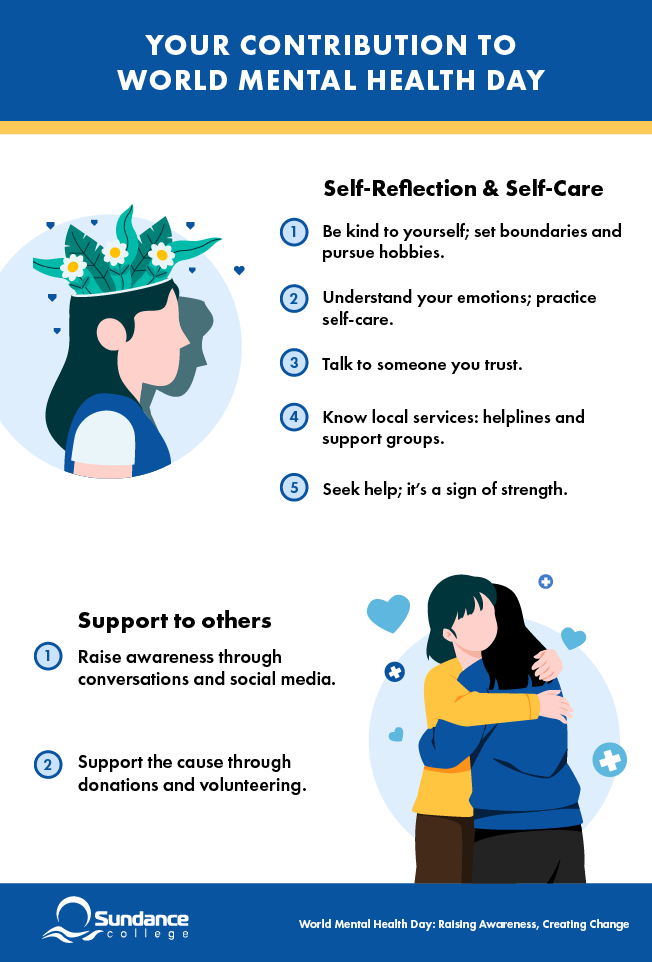Blog / Why Does World Mental Health Day Matter?
Why Does World Mental Health Day Matter?

Explore our Diploma Programs
- Business, Hospitality, and Legal
- Health and Human Services
- Technology
Table of Contents
Did you know that by the age of 40, nearly half of people will have faced or be dealing with a mental health challenge? This statistic shows just how common mental health issues are in our communities. Here’s something even more important: for many, these struggles start before the age of 18.
So, how do we address the rise in mental health problems? Part of the answer is in taking care of our mental health early and throughout life.
This is why World Mental Health Day, observed every year on October 10th, helps raise global awareness about mental well-being. Nurturing mental health in our community is a collective effort. It starts with a coach leading a happy team, a teacher creating a supportive classroom, and workplaces promoting a positive environment.
In this article, we highlight World Mental Health Day, share tips and resources to help prioritize mental wellness, and provide a brief overview of our Addictions and Community Health Professional diploma for those interested in helping others.
Listen to “Why Does World Mental Health Day Matter?”
Why World Mental Health Day Matters
People facing mental health challenges often feel alone , thinking no one else understands them. They may fear that sharing their struggles, such as depression or post-traumatic stress disorder, with coworkers or employers could lead to stigma or even job loss. Many also choose to keep their struggles hidden from friends and family.
World Mental Health Day is important because it:
Breaks The Silence
World Mental Health Day fosters open conversations. It breaks the silence, reduces stigma, and fights isolation. The significance of this day brings the issue to the forefront and helps victims speak up about their struggles without fear, creating a safe space for them and better understanding among everyone.
Educates The Masses
World Mental Health Day provides insights into different mental health challenges people go through. This knowledge fosters understanding and also emphasizes the importance of empathy making it easier for coworkers, friends, and family to grasp what someone might be experiencing.
Promotes Well-Being
World Mental Health Day is all about action. It pushes for spotting issues early, stepping in when needed, and making sure the right resources are there for everyone. The goal is to create a world where everyone is seen and heard. By tossing out stigma, people dealing with mental health challenges can ask for help when they need it thereby promoting mental well-being.
What Can You Do to Contribute to World Mental Health Day?

Before we talk about how to get involved in World Mental Health Day, it’s important to remember that taking care of yourself is the first step in helping others. Just like on a plane, where you’re instructed to secure your own oxygen mask before assisting others, your well-being must come first.
We can approach this in two simple ways: focusing on self-care and then supporting others.
Self-Reflection And Self-Care
On World Mental Health Day, your first commitment is to yourself. Take a moment to:
- Reflect on Your Mental Health: Understanding your emotions, identifying stressors, and acknowledging your feelings are key. Consider the signs – if your job is a constant source of stress or your current position leaves you feeling unsatisfied and unhappy it might be a red flag. Recognizing when it’s time for a change is a powerful form of self-care.
- Practice Self-Care: Whether it’s a few moments of meditation, reading a good book, or simply taking a short walk, make time for yourself. In your busy day-to-day life, this is your anchor. Self-care is not selfish; it’s necessary.
Support To Others
As we navigate World Mental Health Day, extending support to others is equally crucial. Here’s how you can contribute:
- Spread the Word: Awareness comes through conversation. Engage in discussions about mental health with friends, share informative posts on social media, or consider attending local events or webinars dedicated to the cause. By breaking the silence, you become a beacon of understanding in your community.
- Support the Cause: Actions speak volumes. Consider making a difference through donations or volunteering. Your contributions can have a substantial impact, aiding in resource allocation, supporting research initiatives, and fostering the creation of more accessible mental health facilities. Every small effort contributes to a larger, collective push towards mental health and well-being.
Essential Resources for Help
If you or someone you know is struggling, it’s important to seek help immediately. Remember, asking for assistance isn’t a sign of weakness but of strength. Here are essential resources available to you:
Local Health Facilities
Many hospitals and clinics provide mental health services. Reach out to your local health facilities to explore available resources and support.
Helplines
There are national helplines dedicated to addressing mental health concerns, including Talk Suicide Canada: 9-8-8, Kids Help Phone: 1 (800) 668-6868 and First Nations and Inuit Hope for Wellness Help Line: 1 (855) 242-3310. There are also numerous provincial and local helplines. A simple call can connect you with professionals who are ready to lend an understanding ear.
Therapists & Counselors
Professional guidance is invaluable. Therapists and counselors are equipped to offer the necessary support and therapeutic intervention tailored to their patient’s specific needs.
Some of these professionals can be accessed through Wellness Together Canada which provides support for Canadians with mental health issues and addictions. Always virtual and without charge, people can get peer support as well as contact a counselor.
Support Groups
Connecting with others who are going through similar challenges can be deeply comforting. Support groups create a sense of community and understanding, reminding people at-risk that they’re not alone in their journey.
LifeLine Canada Foundation is a national nonprofit organization that focuses on preventing suicide by raising awareness of risk factors, providing online resources, and developing community support systems for both individuals going through a difficult time and those who have lost a loved one.
How You Can Make a Lasting Impact on Those in Need
Do you want to make a difference in the lives of others? Are you driven to positively impact your community? Then, you may want to become a skilled professional in roles such as youth care worker, community outreach support worker, addictions worker, and other sought-after positions in this field.
For this, you need a post-secondary education like Sundance College’s Addictions & Community Health Professional (ACHP) Diploma program. Our ACHP curriculum emphasizes building genuine connections with people in need, understanding their unique backgrounds, and adopting an inclusive approach to care. Through a combination of theoretical knowledge and hands-on training, students are prepared to handle real-world situations.
Through the ACHP curriculum, you will:
- Understand the issues surrounding of mental health and addiction abuse: The program covers chemical and behavioral addictions, including stimulants, depressants, hallucinogens, opioids, cannabis, gambling, food, internet, shopping, and sex. Moreover, it explores prevention techniques, harm reduction strategies, and treatment procedures.
- Master intake procedures and treatment planning: During the program, you’ll learn the topics and processes related to intake, assessment, and factors affecting case management and service delivery. In addition, you’ll be taught practical hands-on exercises and role-playing for intake and assessment skills.
- Develop interviewing and counseling strategies: You’ll develop essential skills for conducting successful interviewing and counseling sessions, emphasizing ethics, values, self-awareness, and evidence-based treatment approaches.
- Understand group facilitation concepts, where you’ll be introduced to basic concepts and skills associated with facilitating a group, including exploration of group stages, processes, therapeutic forces, and the purpose of groups.
- And more, including supporting high-risk populations, exploring family dynamics, and relapse prevention.
Sundance College emphasizes the cultivation of self-care habits for our aspiring addicts and community health professionals. We offer a free mental wellness program to all students that provides 24/7 access to confidential real-time or appointment-based mental health support.
Join Sundance College in Making a Difference

Interested in contributing to World Mental Health? One of the ways is to step into a career where mental health care is central. For this, you need to complete specialized post-secondary education. Sundance College’s Addictions & Community Health Professional (ACHP) Diploma program isn’t just about earning a diploma; it’s about joining a community passionate about helping others and better mental health for all.
According to one of our ACHP graduates, Willoe C.:
“If you are looking for a college with wraparound supports, Sundance is the one. I have completed my ACHP program, and throughout the program – even though it was completed online aside from the Practicum, I had the support of teachers, staff, and other students. Everyone was great and I felt supported throughout the program. I also had total support from friends and family. The Practicum allowed me to put my skills, education, and training into real-life situations to hone them, and I was placed with an amazing group of people.”
We aim for each of our students to have a similar experience. Contact our admission advisors today to explore how Sundance College’s ACHP program can lead you to a fulfilling career with both knowledge and support. Let’s work together in prioritizing, understanding, and supporting mental health.
Subscribe for more career advice
Blog Categories
Share on:
